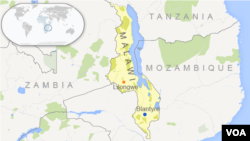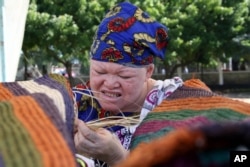Malawi is experiencing an upsurge in mob violence. In three recent incidents 11 people have been killed and a courthouse has been burned.
The latest incident occurred Tuesday in Nsanje district in the south. A mob pounced on seven men accused of possessing human bones for witchcraft.
Joseph Misomali saw it happen.
“We were at home when we heard people shouting close to our house," he said, speaking to VOA by phone. "Then I ran to the place only to find seven people being beaten up. But when I was told that it was an issue to do with human bones I was shocked. I was afraid because I associated that with witchcraft, which is dangerous on my part.”
He says shortly after that he saw the mob set fire to the suspects. he mob even overpowered the police who tried to intervene.
Body parts used in witchcraft
It is believed that the body parts are taken to bordering Mozambique and Tanzania, where witchdoctors believe that potions made from the human body parts, in particular those from albino individuals, bring good luck and wealth.
About a month earlier on January 26, a mob in the southern district of Neno had killed four people, aged between 69 and 89, after a 17-year-old girl died, struck by lightning according to local media. The crowd accused the elderly residents of practicing witchcraft.
And on the night of February 3, angry residents in South Lunzu Township in Blantyre set fire to the Magistrate’s Court. People feared the court would grant bail to three suspected murderers who locals said they wanted dead.
Reactions
Malawians are reacting differently to this spate of mob attacks.
“I feel that it’s quite wrong because everybody has a right to a fair trial, and generally we are taking about people being killed. It's irrational,” said Gerald Manda, a primary school teacher in Blantyre.
But businesswoman Mercy Chanza says people are frustrated. She says they think the courts are being too soft on criminals.
“If the culprits were being caught and given necessary punishment, there was no need to be going on with mob justice because they would have trust in judicial system,” she said.
Mlenga Mvula, a spokesman for the judiciary, disagrees. He says the courts must give any person a right to appeal. He says you can not blame the upsurge in mob justice on the courts following the law.
“If any party is dissatisfied with judgement, they are even told ‘you are at liberty to appeal against this ruling.’ So they are given the procedures to appeal and the magistrate immediately writes those grounds and forwards them to the High Court. But none, if not few who come to say, ‘Ok I am appealing.'"
Judicial system ignored
Mvula says most people engaged in mob justice are ignorant of Malawi's laws.
He says his department is currently requesting about $80,000 to run a nationwide awareness campaign on how the judicial system works.
National police spokesman Nicholas Gondwa says police are also trying to educate people on how they could handle crime suspects.
“We are always on the ground doing community policing meetings," he said. "We are sensitizing members of the general public on these things — mob justice - to at least prevent these things from happening. But people out there are deliberately giving us deaf ears, maybe to frustrate our effort.”
Gondwa says mob justice destroys evidence and makes it harder for police to investigate the alleged crime.
He said police have arrested eight people in connection with the mob killings in Neno and the investigation is ongoing into the recent incident in Nsanje.









